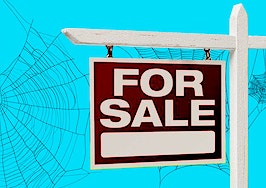Ask a roomful of agents their thoughts on open houses and you’ll get two different opinions. Many believe they are a waste of time, but others find them valuable. So, which is it?
I’ve come to believe open houses can be an important part of an agent’s real estate practice if he or she has the right mindset and a well-thought-out marketing plan. I always look at the two to three hours I would commit on a weekend afternoon at a listing as an opportunity to grow my business.
But this wasn’t always the case. I’ve had several bad experiences with open houses before I acquired my real estate license. They were a result of poor planning, which resulted in the wrong people coming to look at our houses.
My wife and I assumed a prospective buyers would tour our homes and want to make us offers. But that never happened. Instead, neighbors, Sunday afternoon real estate “hobbyists” (those who go to open houses for entertainment), and “tire-kicking” buyers made up most of the people who showed up.
After a few failed experiences, we decided open houses were just not worth the time and effort.
My personal experience with failed open houses carried into my real estate career. During the first few years as an agent, I was very skeptical of hosting open houses for any of my listings. However, my attitude changed after hosting a successful one for a colleague.
One day, Carol, an agent at my first brokerage, asked me to cover an open house she scheduled for a listing in Nashville as she had plans to be out of town. I reluctantly agreed. I made plans to be at her listing the following Sunday afternoon since I thought it might be a good way for me to pick up a buyer prospect or two.
Carol took care of the advertising for the open house. That included installing the signage in the front yard and at the entrance of the neighborhood.
On Sunday, I arrived at the house about 30 minutes early, so I could turn on all the lights, unlock doors, arrange the in-house property flyers on the dining room table and place a registration sheet on a table in the foyer. My wife sent homemade chocolate chip cookies and bottled waters with me so I could offer refreshments for everyone who stopped by the open house.
The first visitors showed up, and I warmly welcomed them in with a smile. It was a young couple with a baby. I asked them if they were working with an agent. They said “no.” I asked some additional questions about their home search after they finished their tour of the house.
We had a great conversation, and I told them I was more than willing to help them find a home. They took me up on the offer, and we scheduled a meeting at my office the following Tuesday.
More people showed up at the open house as the afternoon progressed. In fact, I had more than 30 people look at the property during the two hours I was at the home. An agent from another firm brought her client to see the property.
They liked it and wanted to make an offer. I told them that Carol, who was the listing agent, would be back later that day. She said she would get in touch with her. Well, the two agents talked that evening, the buyer submitted an offer, and the seller accepted it the next morning. The house was under contract.
My entire perspective on open houses changed that Sunday afternoon. Not only did the home sell as a result of the open house, but I also picked up a new buyer client (the young couple with the baby) who contracted on a home a few weeks later. Three years later, I listed the home they purchased and represented them in the purchase of a larger house.
That one open house resulted in more than $21,000 in commission from the sale of properties associated with the buyers I met that Sunday afternoon. So yes, I would say open houses do work!
During the years, I sold several listings and picked up numerous buyer clients through open houses. I have found it to be worth my time, money, and effort to hold both open houses for the public and the brokers.
Open houses are one of the top five ways buyers find a real estate agent, according to research from the National Association of Realtors (NAR). So my point, again, is that with the right planning and organization, you can make sure that open houses are not a waste of time.
This story holds four simple principles that you can learn from to hold successful open houses.
1. Successful open houses begin with thoughtful preparation
Knowing which day to hold the open house is important.
Don’t schedule it on a day when a local event such as a football game, golf tournament or street festival is held. Don’t schedule it on a holiday, when people are likely to be away on vacation.
Go through your calendar, and talk with your active client base to make sure that you don’t have scheduling conflicts. If you do, make sure you have a colleague or other team member cover for you, and brief them on how you want everything presented. Taking care of all these logistical details with so many people’s schedules involved is the reason you need to plan way in advance for the actual event.
Bottom line: Careful planning makes the process much more manageable.
2. Plan your advertising and promotion for the open house
You need to know how to get actual prospective buyers and their agents to the open house.
Consider creating a marketing checklist containing all the specific items necessary to advertise and market the open house effectively. The list should include the following:
- Online marketing: Advertise on all of your social media sites including your business Facebook page, Twitter, Instagram and LinkedIn, as well as your own website. I believe internet marketing is vital because many buyers who are looking online don’t have an agent, meaning this is an opportunity for you to jump in.
- Broadcast emails: You should send an email to your client and prospect database as well as to your agent network including those in your firm, local Realtor association, and multiple listing service. MailChimp, Constant Contact, and Emma offer free and low-cost marketing packages for agents. The Federal Trade Commission (FTC) has comprehensive rules concerning how you send mass unsolicited emails to prospects. Go to the FTC’s website to learn more about complying with the CAN-SPAM Act of 2003.
- Postcards: Send postcards to the neighbors and other select contacts in your database informing them of the open house.
- MLS open house announcement: Most MLS systems provide an opportunity for you to announce your open house. This is probably the best way to reach agents who might have buyers looking for a home in the area where your listing is located.
- Signage: Place an “open house” sign in your listing’s front yard next to your “for sale” sign. Balloons or colorful pennant flags work great in bringing attention to the sign. Make sure you have pointer signs at various locations including at the front of the neighborhood and nearby road intersections. Remember to follow all local and homeowner association sign ordinances when installing your signage.
3. Managing your open house
Remind your client that their property needs to be clean and “ready to go” for this event.
That means: Inside the home, all bathroom vanities and sinks should be clean, carpets vacuumed, hardwood and tile floors swept, dishes washed and put away and garbage cans emptied. They also must make sure that there are no unpleasant smells in the house.
One solution is to ask the seller to bake some cookies right before the open house. Don’t light candles or use air fresheners, as this will make a prospective buyer think you are trying to cover up something.
Outside, the yard needs to be mowed and trimmed, and all landscaping should be cut back. And don’t forget to pick up what the doggie leaves behind in the yard!
If the house is larger than 3,000 square feet, ask another agent to assist you. Arrive at least 30 minutes before beforehand to set everything up.
Turn on the lights and open the blinds, so the home is bright. Have a registration sheet available for everyone to sign.
You might want to utilize an electronic open house registration program that you download to your smartphone or laptop. They’re easy to use and can provide additional capabilities such as branded and customizable follow-up emails, single-property websites, feedback forms, etc. (Go to the Apple app store or Google Play to download these apps.)
Provide “item of value” materials to hand out to those who attend the open house. These pieces may include comparable property reports on homes in the immediate area, a brochure with tips on preparing a home for sale, lender information, data on the schools in the area, etc.
Make sure all of these items have your name, firm name, and telephone number on them. Provide refreshments. People love to nibble on treats at open houses. Cookies, lemonade, bottled water and candy are great options for refreshments to have available in the kitchen or dining area.
Don’t just “stand around” or sit on the family room couch during the open house. Walk around and ask questions about what the buyers are looking for in a home and what their time frame for purchasing a property is. Try to get as much information from the buyers so you can determine whether they might be a qualified prospect for you.
Listen for feedback — positive or negative. An open house can provide an opportunity to “hear” what people think of the home and share what they like and don’t like about it.
The attendees can also tell you their opinion of why the house has not sold. Is it priced too high? Is there something wrong with its appearance or features? Is the backyard not large enough? Ask, and they will tell.
4. Be prepared for the ‘looky-loos’!
Not everyone who comes to an open house is a potential buyer.
You will have neighbors who are curious about what the house looks like on the inside. Many times, they will be very open in providing you with the latest neighborhood gossip. Passersby will stop in because they have nothing else to do.
And then there are the “looky-loos.” Looky-loos are, essentially, open house “hobbyists.” On any given Sunday, they will spend their afternoon visiting open houses because they like looking at other people’s houses. They have no intention to buy your listing or any other home on the market. They are just curious.
Be prepared for all three of these types of people to come through the front door. Greet them politely, as you never know if they know someone who is ready to buy or sell a home.
Don’t do an open house just to do an open house. You should hold an open house only if it increases interest and the chances of landing offers for your client.
New buyer leads and other contacts for your business should not be the primary reason you hold the open house.
Yes, I did say that open houses are a great way to capture prospective clients, but ultimately, you’re there for your client.
If you plan properly and are strategic with your marketing, you’re more likely to land great offers that will lead to a sale your client will appreciate.
John Giffen is director of broker operations for Benchmark Realty, LLC in Tennessee. He is the author of Do You Have a Minute? An Award-Winning Real Estate Managing Broker Reveals Keys for Industry Success.








